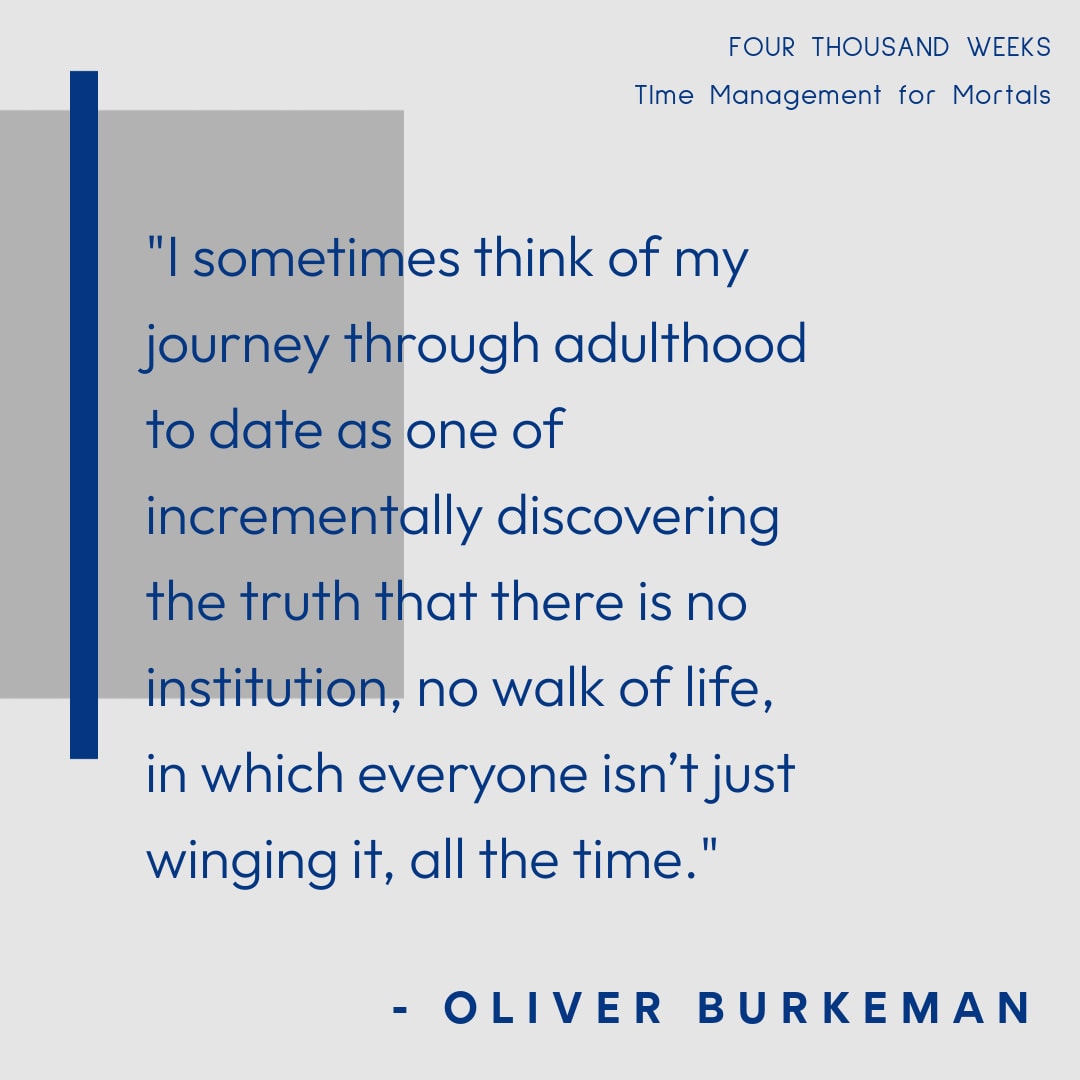I’m not sure when I first learned the concept of “time management.” It certainly wasn’t in my elementary years, when I gave little thought to time beyond when my next meal might be or when my parents would tell me I needed to get ready for school.
Time was fluid in the hours spent with friends, styling our Barbie dolls or skipping across the greenbelt, pausing to lie in the grass and braid crowns made from dandelion stems. And I definitely wasn’t thinking about managing my time when I huddled under the covers with a book light, devouring the latest Babysitters Club long after my parents had gone to bed. Time wasn’t something to be managed, but simply lived out and enjoyed.
Somewhere along the line, though, I lost that. I think most of us do. We become aware that time is not limitless and—whether by nature or nature, societal expectations or internal twinges—we feel driven to make the most of our time, managing it before it gets its hooks into our lives and starts managing us.
My desire to control my time (and really, everything about my life) led me to pick up this book that I assumed would offer some handy tricks and lifehacks. What I got instead was a philosophical examination of time, human nature, and spiritual perspective. This was not initially planned as a book in this Wholehearted series but within a few chapters I knew it was one: Four Thousand Weeks gets to the very core of what it means to pursue wholeheartedness.
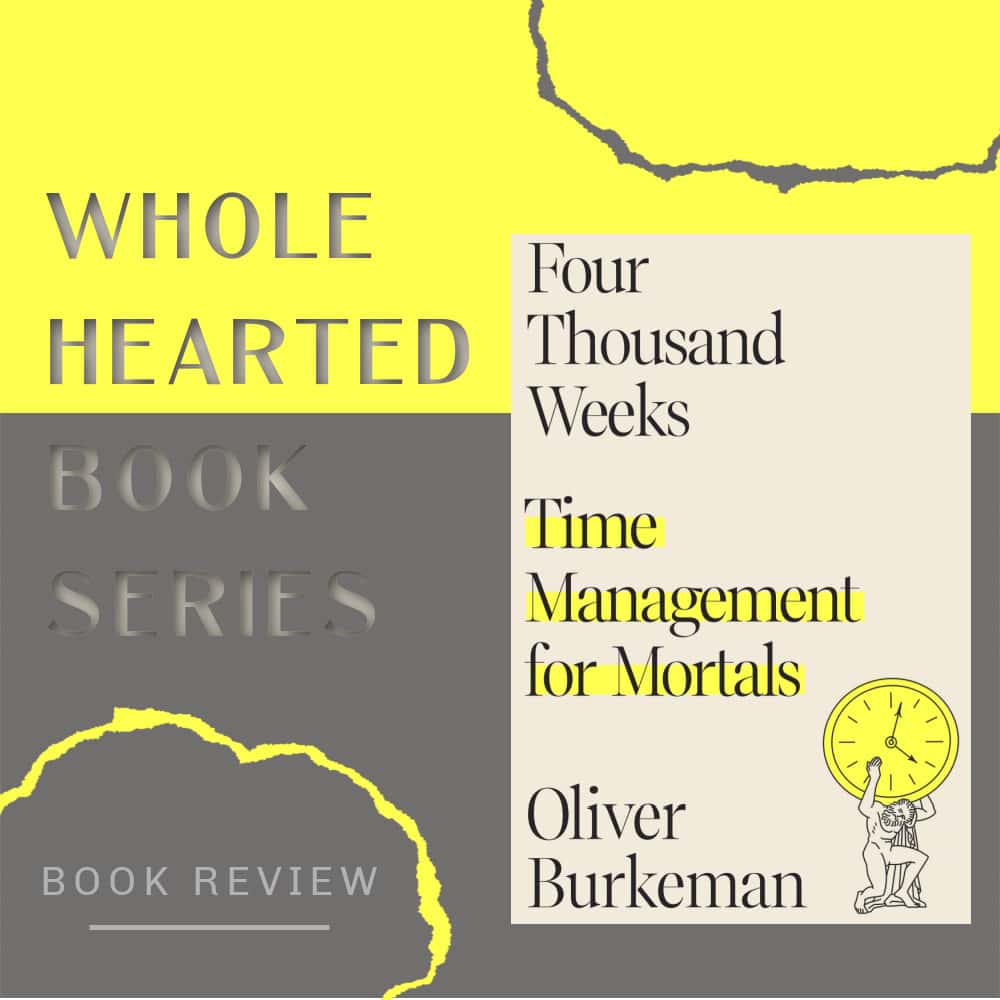
The average human life span is four thousand weeks. That’s it. And even that number isn’t guaranteed. Based on this knowledge of our own finitude it follows “that time management, broadly defined, should be everyone’s chief concern. Arguably, time management is all life is,” writes Oliver Burkeman in his genre-defying bestseller on the subject. But he continues: “The modern discipline known as time management—like its hipper cousin, productivity—is a depressingly narrow-minded affair, focused on how to crank through as many work tasks as possible, or on devising the perfect morning routine, or on cooking all your dinners for the week in one big batch on Sundays. These things matter to some extent, no doubt. But they’re hardly all that matters. The world is bursting with wonder, and yet it’s the rare productivity guru who seems to have considered the possibility that the ultimate point of all our frenetic doing might be to experience more of that wonder.”
With this in mind, Burkeman takes an entirely different approach to managing time. Recognizing that time “is like an obstreperous toddler: the more you struggle to control it, to make it conform to your agenda, the further it slips from your control,” Burkeman gives us the freedom to stop trying so hard to manage it. And he helps us see that the real problem is not our time but “that we’ve unwittingly inherited, and feel pressured to live by, a troublesome set of ideas about how to use our limited time, all of which are pretty much guaranteed to make things worse.”
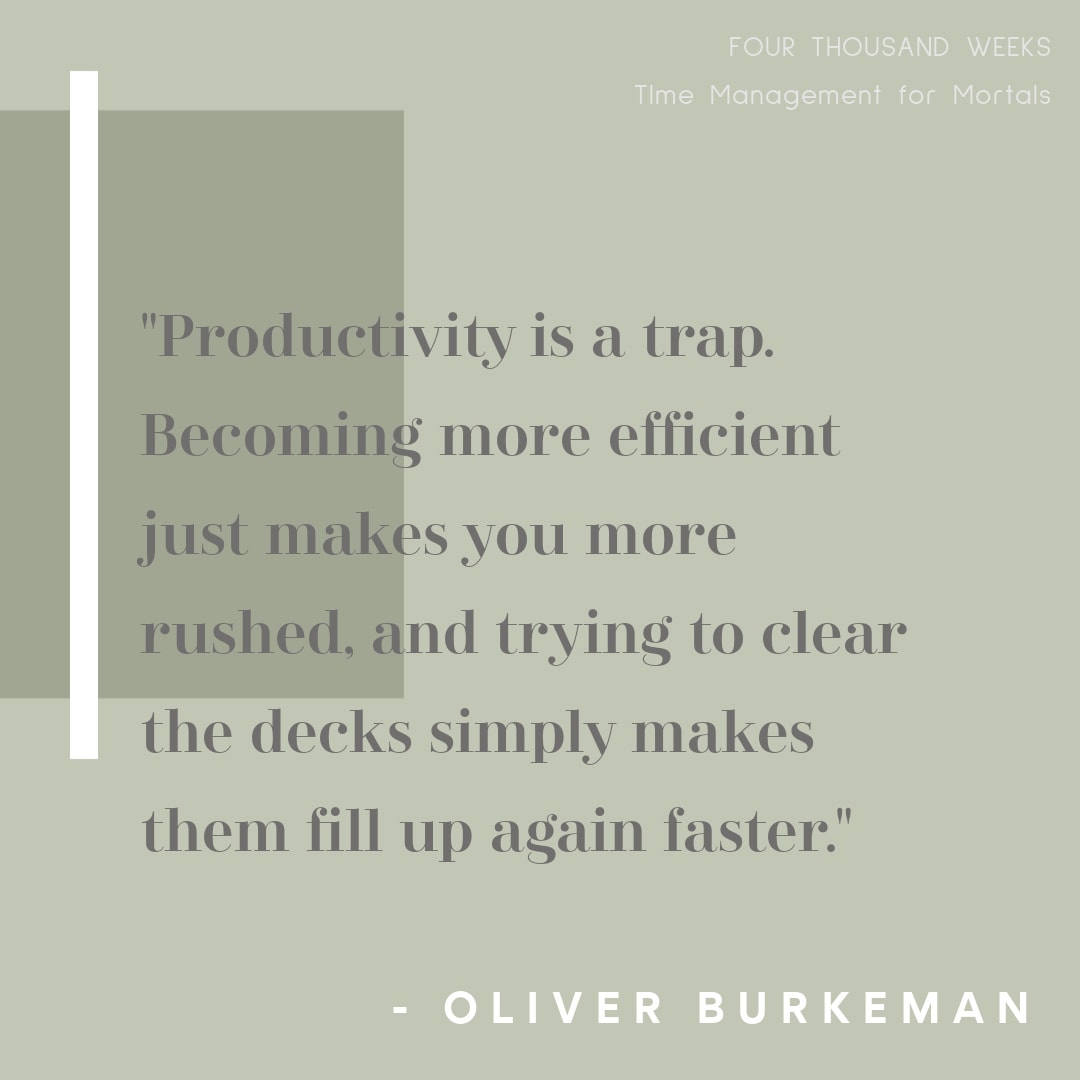
Burkeman begins with a history of our orientation to time, showing that an understanding of time as something to be used or managed is an entirely modern concept. For thousands of years, time was just the medium in which life unfolded. Time was guided by nature, and driven by tasks that followed regular rhythms. Earlier generations would have given little thought to time being “limited;” it just was. The advent of clocks and schedules changed all of that, reclassifying time as a resource to be managed. Now, not only do we feel pressure to “spend our time wisely,” but in doing so we gain some semblance of control—which sometimes works, but can also leave us exhausted and never offers the limitless agency we crave.
The truth is that we really aren’t in total control of our time, and we must make peace with our own limitations if we hope to find freedom from the micro-managing, productivity traps that plague our society. We must recognize we WON’T be able to see and do and experience it all—and in fact we wouldn’t really want to, as time’s finitude is what makes it so very precious to begin with.
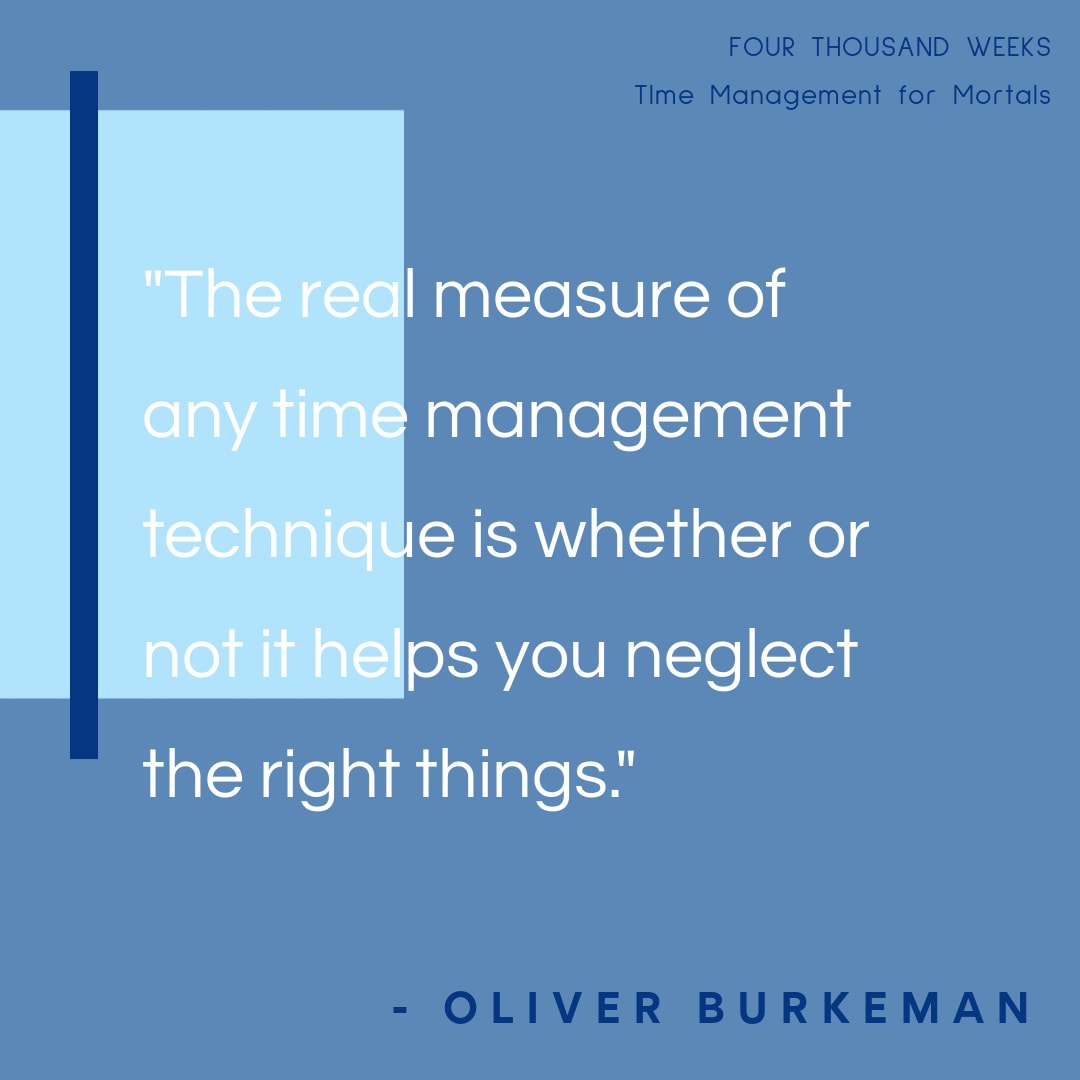
These new ideas and frameworks for understanding time and our existence are worth the price of the book—but all of that comes up in just the opening pages! Burkeman spends the remaining chapters helping us “manage” our time realistically, and from a philosophical standpoint rather than a purely practical one. Each chapter focuses on a new mind shift—many of which completely blew my mind because I had never thought of these approaches in quite this way. For instance, rather than teaching us how to stop procrastinating, Burkeman shows how we can choose when and why we sometimes SHOULD. He gets to the core of our distractedness, identifying technology as a massive time waster—not just because of the time we physically spend on our devices, but how that input has a lingering effect long after the devices are set aside. He offers painfully poignant advice on settling (we all have to do it, and that’s okay) and choosing discomfort (it’s often for our own good) and facing up to our true motives behind obsessive planning (to prepare for when we finally “arrive” which [spoiler] never happens).
Other topics discussed include the importance of rest (specifically, taking a sabbath); expanding our capacity for patience; and using our time for the sake of community—because having more time for ourselves matters little if everyone around us remains unavailable to spend that time with us. Burkeman ends by reminding us of how very small and insignificant we are in the grand scheme of history, which is actually quite freeing in that we no longer feel the weight of personal grandiosity. When we stop overvaluing our potential, we can embrace more realistic expectations on how to spend our time and pursue instead a “moderately meaningful” life.
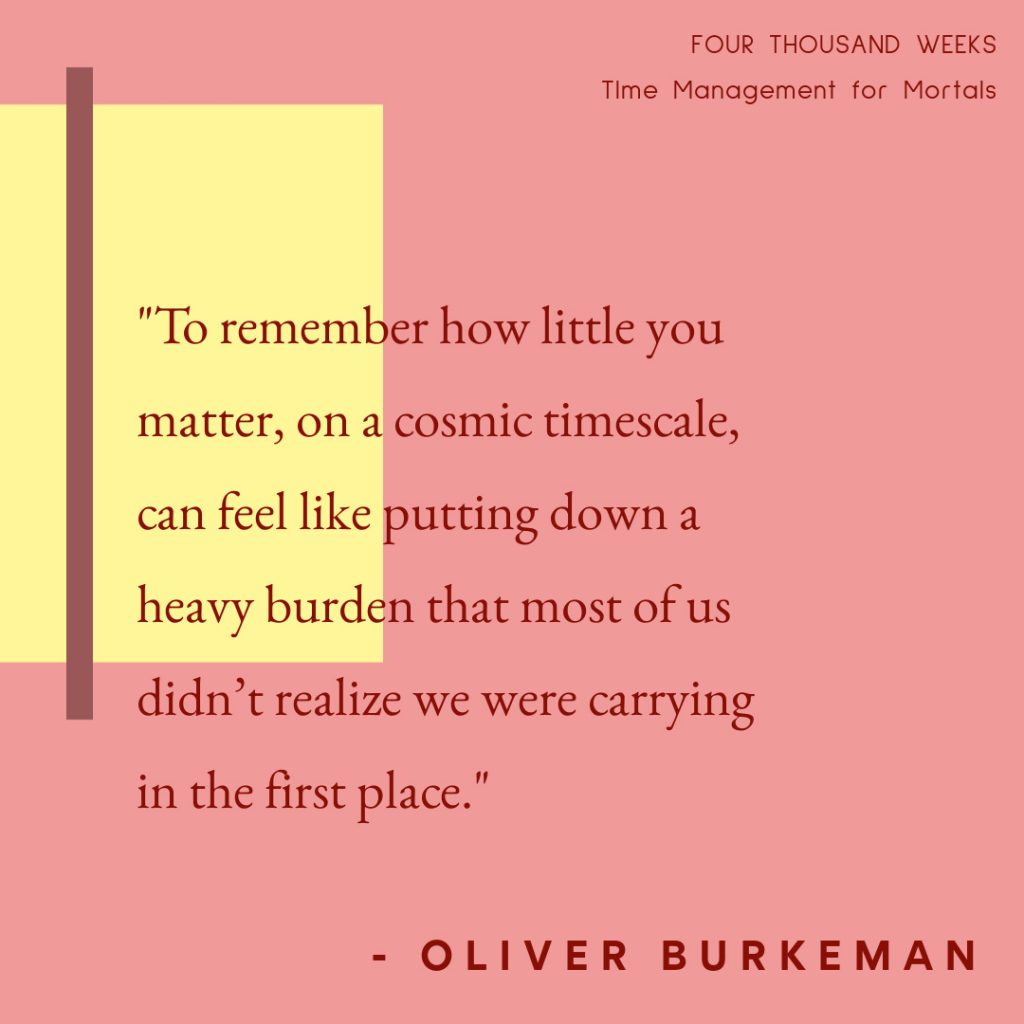
Oliver Burkeman, as far as I know, is not a Christian and this book is written from a secular perspective. I don’t agree with all of Burkeman’s worldview, which leaves no space for divine calling and eternal significance, not to mention the fact that while life on this earth IS finite, our souls are not. However, many of the ideas are lifted straight from Biblical principles: Jesus and Paul and many Old Testament prophets all talk about the brevity of life, of our own smallness in comparison to God, and the futility of attempting to control the future.
The book ends with the encouragement that knowing how little time we have on earth should be “a cause for relief. You get to give up on something that was always impossible—the quest to become the optimized, infinitely capable, emotionally invincible, fully independent person you’re officially supposed to be. Then you get to roll up your sleeves and start work on what’s gloriously possible instead.”
Burkeman falls short of telling us what those glorious possibilities may be—and that’s where God comes in. Not only do I not need to feel pressured to micromanage my time, I don’t even need to worry about the value of that time or my very life because I am well acquainted with the Author of Time Himself. Giving my four thousand weeks over to Him is guaranteed to be glorious.
My Book Rating: 5 Stars.
